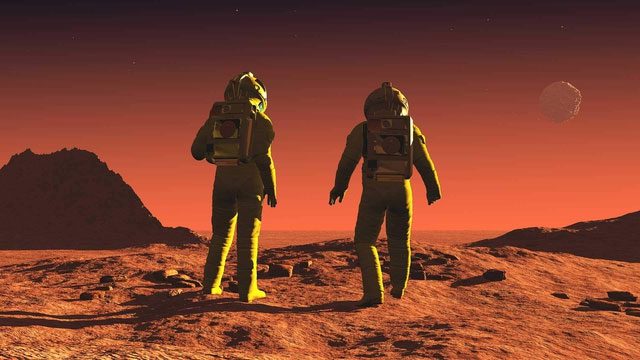The possibility of humans evolving into a new species on Mars is conceivable, but it cannot be stated with certainty.
Since the dawn of human civilization, we have looked to the stars and wondered if there are other intelligent civilizations on distant planets in the vast cosmos.
At the same time, with the development of modern human civilization, there is an increasing desire to migrate to the stars as well as settle on other planets, with Mars currently regarded as the most promising destination.

Humans increasingly desire to migrate to the stars and settle on other planets. (Illustrative image).
Regarding space migration, humanity not only dreams but is also beginning to act on these dreams. For instance, NASA has long planned for a manned landing on Mars. Once a successful landing is achieved, it would mean that humanity has taken the first step towards migrating to Mars, laying the groundwork for larger plans in the future.
However, a manned landing on Mars is a massive undertaking, and the entire process is complex and more dangerous than a manned landing on the Moon.
The one-way trip from Earth to Mars takes at least six months, and every 26 months, there is an optimal window for moving from Earth to Mars, as the two planets come closest to each other during this period—about 55 million kilometers apart, while the farthest distance can reach up to 400 million kilometers.
Consequently, astronauts must stay on Mars for 26 months and wait for the next launch window before returning to Earth. The entire manned mission to Mars will last approximately three years!
Thus, sending humans to Mars is incredibly challenging, requiring assurance that astronauts have enough food and safety for about three years. If everything goes smoothly, the next step would be to consider how to terraform Mars and establish settlements there, aiming to build a self-sufficient colony on the planet.

Humans will explore terraforming and establishing settlements on Mars. (Illustrative image).
To terraform Mars, the first step is to warm the planet. The average temperature on Mars is only -55 degrees Celsius, and such an environment makes it difficult for humans to settle there long-term. In theory, warming Mars is not difficult; humanity is skilled at heating planets, as evidenced by our activities on Earth over the past century.
Establishing factories on Mars would continuously emit greenhouse gases like carbon dioxide, creating just enough greenhouse effect. The type of “carbon dioxide” we despise on Earth would become a useful gas on Mars.
As the temperature of Mars rises, it would allow humans to engage in outdoor activities in the short term, but they would still need to wear oxygen masks due to the low oxygen levels in the Martian atmosphere. How can we increase the oxygen content in Mars’ atmosphere? Algae, moss, and other organisms on Earth could be beneficial as they reproduce quickly and release large amounts of oxygen.
Nevertheless, the terraforming process for Mars will take a long time, potentially requiring hundreds or even thousands of years to complete. But what if humans evolved to adapt better to the Martian environment?

We can accelerate human evolution by manipulating human genes.
In reality, this is entirely possible; Mars has a different environment compared to Earth, with lower gravity, a thinner atmosphere, colder temperatures, and higher radiation levels. These changes can exert natural selective pressure, leading to the survival of individuals with genetic traits that enable better adaptation, allowing them to pass on their genes to future generations.
If the human population on Mars remains isolated from Earth for a long time, there will be less genetic mixing. This could lead to genetic differentiation, where new mutations and adaptive traits spread rapidly throughout the population.
The higher radiation levels on Mars could accelerate gene mutations, resulting in the emergence of more new genetic variations. Some of these mutations could provide advantages for humans in the new environment, contributing to the evolutionary process.
And perhaps we could speed up human evolution by manipulating human genes. The natural evolution process is lengthy, but through genetic engineering, improving human genes could enable us to complete the evolutionary process as quickly as possible. For example, by modifying human skin genes to enhance resistance to cosmic radiation and withstand low atmospheric pressure, humans could eventually eliminate the need for oxygen tanks and directly utilize their skin to absorb energy and oxygen.
At that point, settlers on Mars could be entirely different from traditional humans, evolving into a completely new species: Martians. Due to the vastly different living environment, Martians could develop languages, economies, and ethical concepts entirely distinct from those of Earth inhabitants.





















































